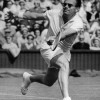By Randy Walker
@TennisPublisher
“I have a question for you” said the rough, Czech-accented voice of Ivan Lendl during a telephone news conference to promote his competing on the PowerShares Series tennis circuit. “Who is the only person to be a world ice hockey champion and a Wimbledon champion?”
The question was directed to Bill Simons of Inside Tennis Magazine in the waning minutes of the call with writers from around the United States.
“That’s a good question,” Simons responded. “I know Ellsworth Vines won ping‑pong and tennis.”
Being the promoter and moderator of this media call, I had an open phone line to speak when I wanted to all of the participants. Since I knew the answer to this trivia question, I chimed in.
“I think I might know the answer to that,” I interrupted. “Drobny?”
“Correct,” responded Lendl.
I remembered reading that Jaroslav Drobny was a standout hockey player in the former Czechoslovakia, the country where Lendl hailed from, during my readings and/or publishing of “The Bud Collins History of Tennis” or the Jan Kodes book of the history of Czech tennis called “A Journey To Glory From Behind The Iron Curtain.” It was a natural question for Lendl to ask, knowing that as a fellow Czech, Drobny was someone who he likely knew a lot about.
“What do I get?” I then joked with Lendl, proud of my correct answer, in a very public forum of a telephone news conference.
“Another question,” dead-panned Lendl in the deliberate voice everyone in tennis is accustomed to. “Who is the only person with an African passport to win a Wimbledon singles title?”
It was a great trick question, but I also knew the answer. It was the same as the first question.
“Drobny!” I answered.
“Correct again,” said Lendl.
“Well, I am the publisher of the Bud Collins History of Tennis,” I reminded Lendl.
“That would be why,” he said.
Collins in “The Bud Collins History of Tennis” wrote that Drobny had “a remarkable two-sport world class athlete: Hockey in winter, tennis the rest of the time. So good was Drob as a forward on the ice that he played a leading role in Czechoslovakia’s winning the world amateur championship in 1947 (he scored three goals in the final game against the U.S.), and gaining silver at the 1948 Olympics. By 1949, though, tennis had become his life.” In 1949, Drobny defected from communist Czechoslovakia with Davis Cup teammate Vladimir Cernik during a Swiss tournament at Gstaad. Egypt offered him a passport so he could continue to travel and play on the international tennis circuit.
Jan Kodes, the 1973 Wimbledon champion from Czechoslovakia, wrote in his “Jan Kodes: A Journey To Glory From Behind The Iron Curtain” book of Drobny, “He was an amazing player who won an unbelievable 133 tournaments and who was inducted into the International Hall of Fame in 1983 with many distinctions.” Drobny won the singles title at the French Championships in 1951 and 1952, but his greatest triumph came at Wimbledon in 1954.
Wrote Collins in his book of Drobny’s win at Wimbledon in 1954, “Drobny at 34 still had a punishing serve, though not as oppressive as it had been prior to a shoulder injury. He was seeded only No. 11 in his 11th appearance at Wimbledon, but upset No. 2-seed Lew Hoad in the quarterfinal, 6-4, 6-3, 6-3, and beat old rival Budge Patty in the semifinals, 6-2, 6-4, 4-6, 9-7. Ken Rosewall overturned top-seeded Tony Trabert in their semifinal, 3-6, 6-3, 4-6, 6-1, 6-1, but couldn’t get past Drobny in the final, 13-11, 4-6, 6-2, 9-7, in two hours, 37 minutes. Drob became only the second left-handed champion, following Norman Brookes in 1907. No one could have imagined that Rosewall, in the final for the first of four times at age 19, would never win the singles title he coveted most. The galleries loved Drobny, the expansive Czech refugee in dark prescription glasses. “No better final had been seen since Crawford and Vines 21 years before,” judged Lance Tingay. “The warmth of Drobny’s reception as champion could not have been greater had he been a genial Englishman. In a sense he was, for he had married an Englishwoman and lives in Sussex.”
Drobny’s final win over Rosewall lasted in 2 hours, 37 minutes, making it the longest Wimbledon final at that time. Wrote Collins, “Drob was the Big W’s remotest-chance success then, although non-seeds Boris Becker (1985), Richard Krajicek (1996), Goran Ivanisevic (2001), 11th seed Pat Cash (1987) and 12th seed Andre Agassi (1992) were to join his long-shot club.” His win also gave him the distinction of being the first Czech-born player to win a Wimbledon singles title. Drobny became a British citizen in 1959, and lived in London until his death in 2001. He was inducted into the International Tennis Hall of Fame in 1983.
To pre-order the soon-to-be-updated and re-released edition of the “Bud Collins History of Tennis” click here: http://www.amazon.com/dp/1937559386/ref=cm_sw_r_tw_dp_oceStb0CA3ZHE8R6
To order the Kodes book about the history of Czech Tennis, “A Journey To Glory From Behind The Iron Curtain” click here: http://www.amazon.com/dp/0942257685/ref=cm_sw_r_tw_dp_MbeStb1HH130DNA2

